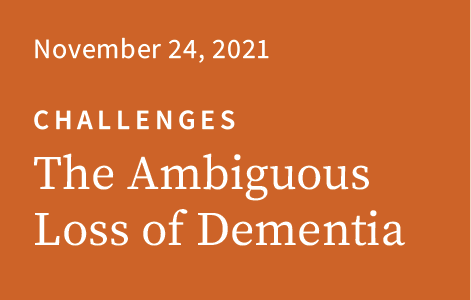Transcript
The Ambiguous Loss of Dementia
When we think about loss, most of us typically think about mourning a close relative or friend who has died. We understand there is a clear demarcation between having that person here with us, alive, and then experiencing his or her absence. We know there is generally a period of bereavement lasting weeks, months, or years during which we experience strong emotions, slowly accept the finality of that person’s loss, and integrate it and our cherished memories of that person into our lives as we go on.
But family members of loved ones with Alzheimer’s disease and related dementias suffer a different kind of loss while watching them slowly lose their abilities to remember, reason, and speak. It is heartbreaking to lose the person as they once were, but there are no clear demarcations here between life and death, presence and absence, and therefore no clear guidelines for when or how to grieve.
I went through this personally while caring for my mother, who had vascular dementia, for seven years. Even as a clinical psychologist with decades of experience working in the dementia field, writing books and giving frequent talks on helping dementia caregivers cope better, I couldn’t or wouldn’t recognize the signs that I was gradually losing my mother and the commanding personality that she was. Instead, I found myself straining to make excuses for her when she made cognitive mistakes or getting annoyed with her when she wasn’t being herself. I could see the disjunction between how she looked—in her usual makeup and fine attire—and her thinking difficulties, but I still bridled at her growing absence. It was only in the latter stages of her disease that I was able to better separate the person she was from the person she’d become and care for who she was at that moment without judgment. It made those last months a more accepting time for both of us and helped prepare me for the full mourning I still go through now four years after her death.
Pauline Boss, a psychologist and Professor Emeritus at the University of Minnesota, has termed this kind of loss “ambiguous loss” and contends it is the most stressful type of loss there is. Dr. Boss delineates two types of ambiguous loss.
In one scenario, the person can be physically present but cognitively or emotionally absent. This is the situation of dementia caregivers tending to a loved one who is still here in body—and who requires lots of bodily care—but whose personality and thinking have been irrevocably altered. The person with dementia is ever present to us but also mostly absent.
Boss depicts the second type as a person who is still emotionally connected to us but physically absent. She suggests this happens to family members of military personnel who are missing in action or those whose loved ones have been kidnapped. Here, too, absence and presence are blurred.
Why is this lack of clarity so stressful? If the person we care about is not completely absent, then we can’t mourn him fully without also feeling confused and perhaps guilty that we are writing him off too soon. We find ourselves in a tense state of half-mourning from which we desperately desire relief, but for which there is no immediate or evident path to resolution.
Let’s look at this more closely, starting with someone in the early stages of dementia. You notice over time that your father, say, seems to be changing. Perhaps he’s less attentive and quieter, more disengaged. At other times, he’s snappier, saying hurtful things you’ve never heard him say before. Observing those changes in and of themselves would be confusing and upsetting for you. But they are also not consistent. At other times he seems more like his usual easygoing self. Those inconsistencies are what is often known as the waxing and waning of dementia. How do you handle this emotionally? In your mind, do you accept that your dad has changed and therefore mourn the loss of who he used to be? Or do you keep looking for glimpses of who you think he really is and discount the growing signs of permanent changes?
It becomes even more confusing with someone in the later stages of dementia. At this point, it is clearer to you that your father’s brain has been severely damaged by Alzheimer’s disease and his mind is mostly vacant. He sits in his living room chair and stares straight ahead at the TV, saying or doing little. He seems mostly oblivious to you and can no longer take care of himself. You know that who he is—or, rather, was—is gone. You are grieving his disappearance—in part. But you are also feeling terribly burdened by his requirements for physical care, such as the dressing, grooming, feeding, bathing, and toileting. You can’t ever leave him alone. You are in a conflicted state from which you want relief—want it very badly—but don’t dare wish him dead, though you also know that that essential part of him that was him is beyond your reach.
How should we handle this excruciating ambiguity? In my experience, different families use a range of approaches.
At one end of the spectrum, there are those who completely separate the person they love from the person with dementia. They grieve the former and manage the latter in workmanlike fashion. I can remember meeting with three adult sisters of a mother who had vascular dementia with marked personality changes. One of the sisters said to me, “Our mother is dead. We have this other person we must take care of. But the woman who raised us is dead.”
At the other end, there are family members who minimize any sense of loss by pretending the person with dementia is relatively unchanged, even in the late stages. I can recall the husband of a woman with Alzheimer’s dementia who ignored her symptoms as much as possible, taking her out to lunch and appointments every day as his constant companion.
I don’t believe there is one right way of coping with ambiguous loss that applies to every dementia caregiver. But there are some basic ideas that may be helpful:
- Identify the aspects of ambiguous loss in your dementia caregiving situation. Accept that those ambiguities make the caregiving more stressful. Don’t judge yourself as a bad caregiver or bad family member for feeling stressed.
- Accept that you are going to have a range of feelings, from denial to sadness to anger, about the situation at different times. It is normal to feel ambivalence when faced with ambiguous loss. Having sadness or anger—or even hoping that your loved one will die—does not make you a bad caregiver or family member. These feelings mean you are having a very human reaction to an extremely stressful circumstance.
- Try to find new meanings in the ambiguous loss. What does it mean to you to continue caring lovingly for someone who may no longer even recognize you? Are you honoring who the person was, supporting your family through crisis, or upholding your values and morals as a good, caring person? If you are a person of faith, then do you see the sacrifices you are making on behalf of someone in such terrible decline as soul-replenishing, spiritual work? These deep, personal reflections can carry each of us through difficult times.
During difficult times filled with ambiguity, we can still stake out sharply defined paths forward through the clarity of our sense of purpose.
Barry J. Jacobs, PsyD
Principal
Health Management Associates
www.loveandmeaning.com

